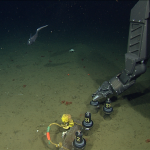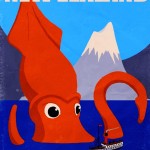A team under the Deep Atlantic Stepping Stones project possibly has unofficially discovered a new species of deep-sea eel. According to the explorers, numerous underwater sea mountains were also discovered, separated from each other by deep water and unexpectedly shaped like squares and triangles rather than cones. The highest seamount recorded by the expedition was 14,100 feet, and was 16,400 feet below the surface. The team plans to name the seamounts after science luminaries. The team members also report they have discovered a significant piece of the reproductive puzzle of deep-sea dumbo octopus. The scientists were excited to discover a dumbo octopus egg attached to bamboo coral. They had not known where the species chose to deposit each of its 3,000 eggs.
This news ties in with next segment of 25 Things You Should Know About the Deep Sea. In a previous segment I discussed the immense species richness of this environment. Every new deep-sea exploration, by ROV, submersible, or sampling gear, yields new species to science. Of those that have been described, we know little about key aspects of their lives, like the reproduction of the dumbo octopus. Consider that the ultimate gauge of information, a google search, for “deep sea new species” yields 151,000 hits and “undescribed species deep sea” yields 26,000 hits. Grassle and Maciolek (1992) put the estimate at 10 million undescribed deep-sea species. Although this estimate is considered high by some scientists, even lower estimates would be in the 1 million range. Each deep-sea sample yields anywhere between 10% in the best studied regions to 90% new species in newly explored areas. This problematic situation can be tied to 4 primary reasons. 1. The deep sea is undersampled and relativley unexplored. 2. A lack of deep-sea taxonomists. 3. High species diversity of the deep-sea diversity. 4. The deep sea is extremely patchy environment, with each patch hosting a new subset of species (this is tied into number 3, more on this later.).
Share the post "ARCHIVE: 25 Things You Should Know About the Deep Sea: #5 Most Species are Undiscovered/New to Science"






Hmm. I wonder if Deep Atlantic Stepping Stones has an acronym…